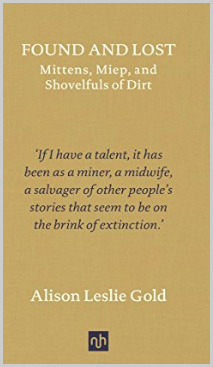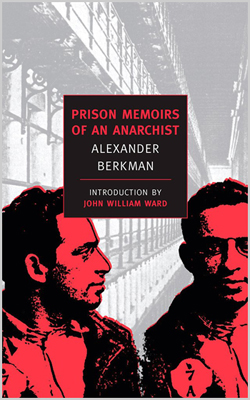Julie recommends: Found and Lost: Mittens, Miep, and Shovelfuls of Dirt by Alison Leslie Gold
 As a bookseller, I don’t take recommendations lightly, especially when a “recommendee” is seeking to soothe or be soothed after experiencing loss. Suggesting the wrong book to someone in pain feels like a lesser form of medical malpractice. Now when people come into the store asking for a title related to grief, I know just the book to place into their hands: Found and Lost by Alison Leslie Gold.
As a bookseller, I don’t take recommendations lightly, especially when a “recommendee” is seeking to soothe or be soothed after experiencing loss. Suggesting the wrong book to someone in pain feels like a lesser form of medical malpractice. Now when people come into the store asking for a title related to grief, I know just the book to place into their hands: Found and Lost by Alison Leslie Gold.
I hesitate to claim that books are a prescription for grief. When a friend of mine died suddenly a couple years ago, the last thing I wanted to do was read. In fact, I was reading (or cramming rather) for a class when I got the news; returning to the page, the print, language itself, was incomprehensible.
This is to say that when I initially read Gold’s prologue I felt strangely combative. She writes:
Not long ago a dear friend died, and shortly after that an aged aunt. So began a series of deaths. I became unmoored.
I fought a voice in my head that said, “Oh yeah?” I’ve been to so many funerals, that if there’s even the slightest wobble in my mother’s voice when she calls, my knee-jerk response is to ask, “Who’s dead?”
If there hadn’t been something so authentic in the tone of Gold’s prose, I might have stopped reading. “These were not my first experiences of loss,” she continues. “Several decades before, I had lost myself. I was a woman seriously adrift.” These lines feel earned, the weight behind each word tugs at you. From the onset, there’s an overwhelming sense that Gold isn’t prone to the confessional mode, nor does she parade her pain, or succumb to the sort of expository oversharing that seems synonymous with memoir writing.
“I always kept my personal life apart from my writing. Until today,” she writes. What follows the prologue is an incredible exploration of form. Gold’s Found and Lost reshapes memoir in one of the most inventive and moving ways I’ve yet to encounter in all my years of voraciously reading non-fiction. In a little over two-hundred pages, the book is a hand-sewn tapestry of letters, narratives (or “Interlogues” as they’re titled), lists and imagistic phrases. Interspersed throughout the text are poetic lines in a red italicized font that appears, to my eye, like a careful stitch-work that pulls the fragmentary material together.
Small tangerines with attached branches hung on my front doorknob in a plastic bag
It’s a bit like reading Basho’s haibun, except the terrain that Gold travels is not a landscape but encounters with past and present selves. Her excavations typically begin with a salutation: “Hi,” “Dear,” “Chère,” “Shalom,” “Geachte Mevrouw.”
A truncated sample:
Dear Alison Gold,
Were you once Alison Greenwald? I hope I’m not being foolish in my hope that you might remember me…[i]n the last years I knew you, you were only happy when you were setting fire to the drapes. Do you still bat for both teams? Do you still have high arches? Do you still wear Pucci underwear? Do you still look like Natalie Wood?
As I became familiar with the chorus of speakers, I began to crave the letters for their charm, humor, tonal variety, and revelatory details that shaped a chronology, a chronology that returns to sites of pain and beauty in a nonlinear way.
With her sister, Gold visits the grave of her friend, Lily.
I poured coffee for us all, left yours with a piece of bread on the gravestone. My knees went out from under me as I walked to the bench beside the church—buckled, actually. I didn’t fall, just crumbled against the stone. Am hurt but did not drop the remaining coffee and bread.
I treasure writing like this, how well it captures life’s capacity to mock us. This is apparent in nature too when even a bird might prefer to be captive. Another passage:
Dear Dorothy,
This would have made you smile: My neighbor’s lost love bird landed back on his terrace railing. When my neighbor carried its cage to the door of the terrace the love bird dropped a glistening tear of chartreuse shit on the railing, then hopped back into the cage.
Love,
Alison.
Gold achieves the sort of intimacy one finds mainly in lyric poetry, I’m thinking especially of Sappho, and the “overheard” nature of her poems. As I was reading, I kept wondering how she achieved this quality in prose. Perhaps it’s that as readers we’re eavesdropping on conversations not meant for our ears. Perhaps it’s the very mechanics of letter writing that spurs honesty, brevity, and a presentation of “self” chosen for a particular recipient.
One of the most memorable conversations I had with my friend took place in the car, as she was driving me home from an editing and publishing course we were both taking. Merging onto the freeway, she said, “You’re a good writer, but you really need to work on your sentences.” Her advice stung. My simple sentences revealed a simple mind. Only later did I realize that her call for complexity, variety, a semicolon (or two) was about making an effort to push my thoughts, ideas, and observations to their fullest development. To be less timid, I needed to take off the training wheels of subject/verb. In many ways, I’m still trying to live up to her expectations because she was one of the first individuals to expect anything better from me at all.
This might seem like a wild digression into the personal, except that I believe that a good book makes you contemplate your life. Found and Lost acts as catharsis; its art is in how it continues to live on in the reader; like a dear friend, you simply will not want to let this book go.
 Does anybody remember the Homestead Strikers, Henry Clay Frick, or Carnegie Steel? Well, within that mess of history was Russian immigrant/anarchist Berkman, who in 1892 went to prison for attempting to assassinate the brutal industrialist Frick. This book, published six years after his release, captures his experiences while serving fourteen years out of a twenty-two-year sentence. It is a passionate and painful account of prison, politics, and being an outsider.
Does anybody remember the Homestead Strikers, Henry Clay Frick, or Carnegie Steel? Well, within that mess of history was Russian immigrant/anarchist Berkman, who in 1892 went to prison for attempting to assassinate the brutal industrialist Frick. This book, published six years after his release, captures his experiences while serving fourteen years out of a twenty-two-year sentence. It is a passionate and painful account of prison, politics, and being an outsider.

 As a bookseller, I don’t take recommendations lightly, especially when a “recommendee” is seeking to soothe or be soothed after experiencing loss. Suggesting the wrong book to someone in pain feels like a lesser form of medical malpractice. Now when people come into the store asking for a title related to grief, I know just the book to place into their hands: Found and Lost by Alison Leslie Gold.
As a bookseller, I don’t take recommendations lightly, especially when a “recommendee” is seeking to soothe or be soothed after experiencing loss. Suggesting the wrong book to someone in pain feels like a lesser form of medical malpractice. Now when people come into the store asking for a title related to grief, I know just the book to place into their hands: Found and Lost by Alison Leslie Gold.